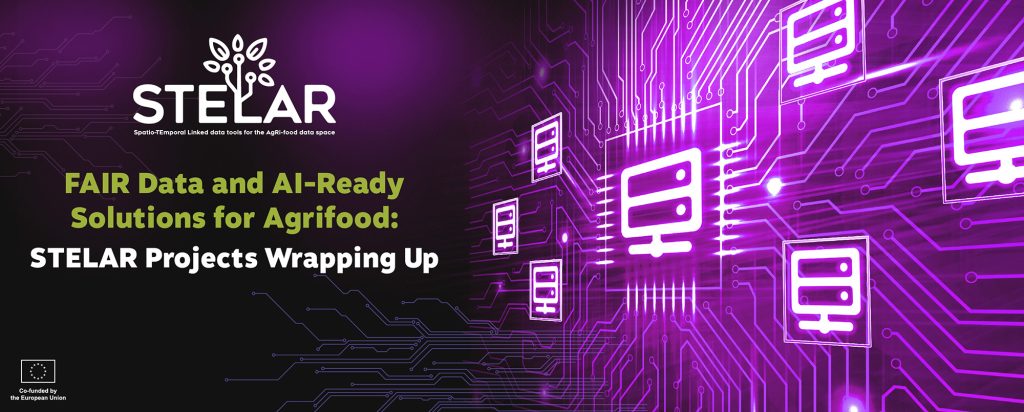STELAR Project Reaches its Conclusion – Delivering FAIR Data and AI-Ready Solutions for Agrifood

The STELAR project will officially conclude on 31 August 2025, marking the end of three years of innovation in FAIR data management and data preparation for the agrifood sector. Led by the Athena Research Center, with Dr. Dimitris Skoutas as the project coordinator, STELAR has built a data management platform and toolkit that will continue to serve researchers, SMEs, and public bodies well beyond the project’s lifetime.
The Knowledge Lake Management System (KLMS): STELAR’s Flagship Result
At the heart of STELAR lies the Knowledge Lake Management System (KLMS) – now available online for anyone to explore and test. This open-source data management platform streamlines the preparation of data for AI applications and follows the FAIR principles (Findable, Accessible, Interoperable, Reusable).
The KLMS offers:
• Data storage
• Metadata catalogues
• A knowledge graph
• Data processing tools
Built to be modular and interoperable, KLMS facilitates the creation of high-quality datasets and fosters collaboration across institutions and use cases.
As part of the KLMS ecosystem, STELAR has also delivered a Toolkit of domain-specific and general-purpose modules. These range from crop classification and food safety forecasting to data profiling and integration. Users can access these tools directly within KLMS or individually via GitHub.
Final Event
On 23 July 2025, STELAR hosted its Final Event, where participants joined a live walkthrough and demonstration of the KLMS platform. This milestone gathering showcased how the project’s tools and workflows can be put to use, ensuring that its legacy extends well into the future. Find out more about the event here.
Pilots: From Concept to Real-World Practice
To demonstrate its real-world impact, STELAR ran three pilot projects – in Greece, Germany and Italy – addressing pressing challenges in agriculture and food systems. Each pilot is presented through a dedicated video, offering a closer look at how STELAR tools aid everyday data management in agriculture. Watch our pilot videos below.
A Strong Consortium and European Collaboration
The STELAR consortium, co-funded by the European Union, unites nine partners from five countries:
• Athena Research Center (Coordinator; Greece)
• National and Kapodistrian University of Athens (Greece)
• Eindhoven University of Technology (Netherlands)
• University of the Bundeswehr Munich (Germany)
• Altair RapidMiner (Germany)
• Agroknow (Greece)
• VISTA GmbH (Germany)
• ABACO (Italy)
• Foodscale Hub (Serbia)
Throughout its journey, STELAR strengthened its impact by collaborating with projects such as CrackSense, WiseFood, and Space2Agriculture, and by engaging with alliances and SCAR working groups across Europe. These synergies ensured that STELAR’s story resonated not only with the research community, but also with policymakers, practitioners, and wider society.
Looking Ahead
Although STELAR is coming to an end, its results remain open and accessible, ranging from open-source software to published scientific articles and blog posts. More results will come out of STELAR after August 31st, which will additionally enrich the post-project sustainability roadmap of the project.
Notably, STELAR has collaborated with its sister projects enRichMyData, DataBri-X, Green.Dat.AI, SEDIMARK, and WATERVERSE to co-author a report that aims to review and analyse the principal technological approaches adopted by these six EU projects to address the challenges of sharing and managing data in the development of data spaces. This report will be published in the following months as a joint publication and will be interesting for researchers and practitioners since it informs future initiatives and provides recommendations.
The STELAR project invites these researchers and practitioners, as well as all innovators, to explore the KLMS platform, test the toolkit, and continue building upon its legacy. Visit the STELAR website for more.